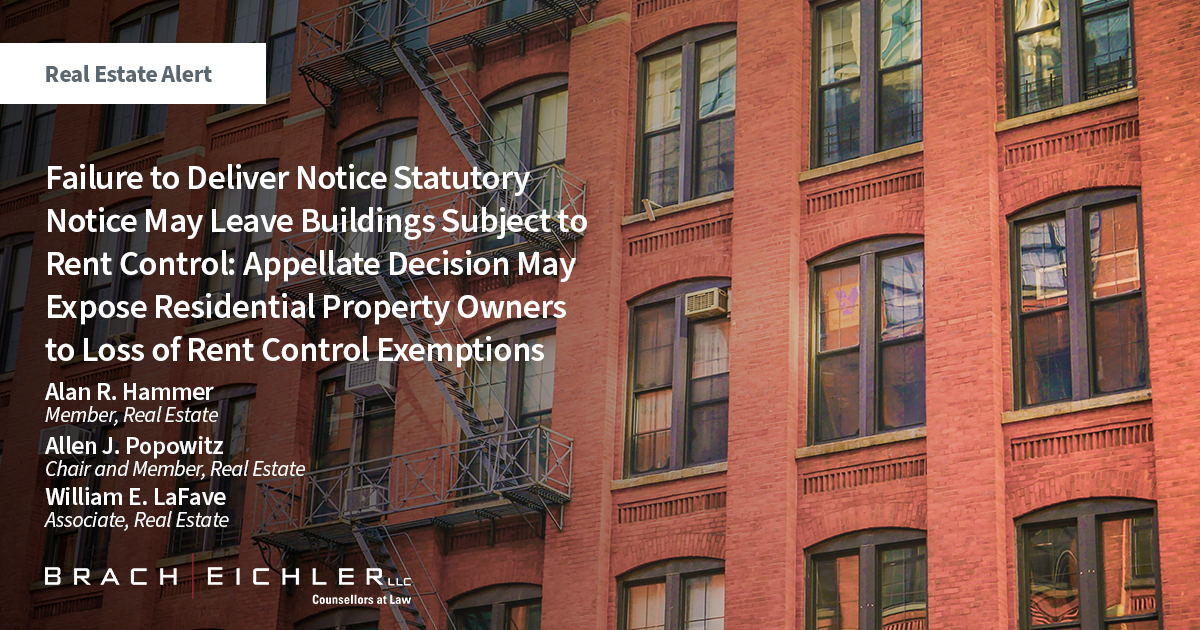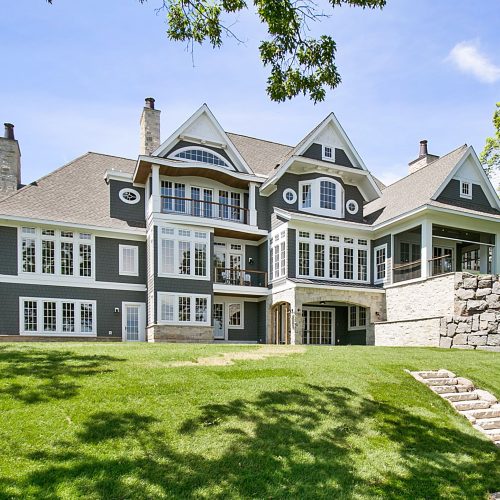Failure to Deliver Statutory Notice May Leave Buildings Subject to Rent Control: Appellate Decision May Expose Residential Property Owners to Loss of Rent Control Exemptions

A recent Appellate Decision may threaten the exempt status of certain residential buildings in New Jersey from local rent control and rent leveling laws, creating the potential for serious ramifications for property owners, developers, builders, and prospective purchasers of property in the residential sector.
In its decision for Willow Ridge Apartments, LLC v. Union City Rent Stabilization Bd., handed down in early July, the Court held that an owner’s failure to strictly comply with requirements set forth in the New Jersey Newly Constructed Multiple Dwellings Law (NJNCMDL), and to maintain records of such compliance when claiming a permitted exemption from local rent control or rent leveling laws, may result in the loss of any such exemption. Of particular note, the decision maintained that an exemption may be lost even if an owner and a municipality each historically conducted their affairs as if such exemption was in place.
The NJNCMDL provides, in part, that Owners may claim an exemption from local municipality rent control and rent leveling statutes for residential properties constructed subsequent to June 25, 1987, for a period of up to 30 years. Specifically, N.J.S.A. 2A:42-84.4 of the NJNCMDL provides:
“The owner of any multiple dwelling claiming an exemption from a rent control or rent leveling ordinance pursuant to this act shall file with the municipal construction official, at least 30 days prior to the issuance of a certificate of occupancy for the newly constructed multiple dwelling, a written statement of the owner’s claim of exemption from an ordinance under this act, including therein a statement of the date upon which the exemption period so claimed shall commence, such information as may be necessary to effectively locate and identify the multiple dwelling for which the exemption is claimed, and a statement of the number of rental dwelling units in the multiple dwelling for which the exemption is claimed. The owner shall, at least 30 days prior to the date of the termination of the exemption period afforded pursuant to this act, file with the municipal construction official a notice of the date of termination of the exemption period for the affected multiple dwelling.”
The NJNCMDL provides that delivery of notice as required exempts a newly constructed residential property from rent control and rent leveling laws enacted by local municipalities for a period of either 30 years, or, the amortization period of an initial mortgage placed on the property (whichever is sooner). The Appellate Decision at issue, however, maintains that such an exemption is only valid if a property owner maintains strict compliance with the notice provisions in the statute, and sends proper notice of its claim to the municipality where the property is located. Notably, the statute itself is silent on what the consequences of failure to strictly comply with statutory requirements are, and/or what remedies are available to parties when an owner fails to so comply.
In terms of background, the plaintiff, Willow Ridge Apartments, LLC (“Willow Ridge”, or “Plaintiff”), purchased a multifamily residential building in Union County (the “Property”) in 2015. The construction of the Property was completed in 2002. Both the initial owner (“Initial Owner”) and Willow Ridge operated the Property as exempt from rent control laws from the date of its completion. Despite its operating history, however, the Union City Rent Stabilization Board (the “Board”) notified Willow Ridge in 2019 that the Property was not eligible for an exemption under NJNCMDL, as the Board had no records proving that a notice of Initial Owner’s claim for an exemption was appropriately filed at least 30 days prior to the issuance of a certificate of occupancy for the Property.
Plaintiff made several arguments to contradict the Board’s assertion, maintaining that the Property must be exempt from Rent Control because it was constructed prior to the enactment of the NJNCMDL, and (i) the statute did not specifically provide for the loss of an exemption due to failure to properly file a claim, (ii) that Plaintiff could not have properly filed a claim of exemption as it did not own the Property at the time, (iii) disqualification of the Property from its exemption as a result of clerical oversight was “unduly punitive”, and (iv) the Board’s failure to locate the notice of a properly filed claim was possibly due to its own failure to maintain records (as opposed to Initial Owner’s failure to properly notify the municipality of its claim).
Plaintiff also proffered evidence in support of its claims, including (a) a letter from a broker involved in the Sale of the Property to Plaintiff, which detailed a conversation with the Board that confirmed the Property was exempt from Rent Control, (b) a letter from the Initial Owner stating the Property was exempt from rent control under NJNCMDL, and (c) testimony that a Union City official confirmed prior to Plaintiff’s purchase of the Property that the property was exempt from Rent Control.
Rather than consider Willow Ridge’s arguments and evidence on an equitable basis, the Board maintained that Willow Ridge’s evidence did not prove that an exemption notice was properly filed under the NJNCMDL by the Initial Owner, and, as a result, the Property was not exempt from rent control. The trial court found for the Board, and, in its opinion the Appellate Court affirmed, confirming that the burden of proving that a claim for exemption was properly filed lies with an owner, and, that failure to strictly comply with notice provisions in the NJNCMDL in connection with a claim for exemption will result in a failure of such exemption to apply to a property.
The decision by the Appellate Division holds implications for both current and future owners, as well as builders of residential properties in New Jersey:
• Current property owners will need to be able to prove that a notice of claim for exemption was properly filed at least 30 days prior to the issuance of a certificate of occupancy if challenged by tenants or a municipality. As noted, the decision at issue makes it clear that courts will not consider whether the current owner was the builder of the property, or, whether it received assurances from either previous owners or municipal officials, and historical treatment will not bear on a court’s decision. Current owners should search their records and make efforts to preserve proof of compliance with the NJNCMDL as a result.
• Prospective purchasers of residential properties should require proof of compliance with the NJNMCDL in contracts for sale, and should carefully preserve any such evidence in preparation for any future challenges.
• Builders of residential properties that plan on filing a claim for exemption under the NJNMCDL should be mindful of the 30-day notice requirement when timing the sequencing of the project as it nears substantial completion. It may be prudent to require a general contractor in its construction agreement to give at least 30 days’ notice prior to substantial completion so that the appropriate notice can be filed. It bears noting that the Appellate Division held that the intent of the 30-day notice provision was to give a municipality time to inspect projects in order to ensure compliance with the NJNMCDL for purposes of compliance with exemption requirements.
For more information, please contact:
Alan R. Hammer, Member, Real Estate Law, at ahammer@bracheichler.com or 973-403-3113
Allen J. Popowitz, Chair and Member, Real Estate Law, at apopowitz@bracheichler.com or 973-403-3134.
*This is intended to provide general information, not legal advice. Please contact the authors if you need specific advice.











